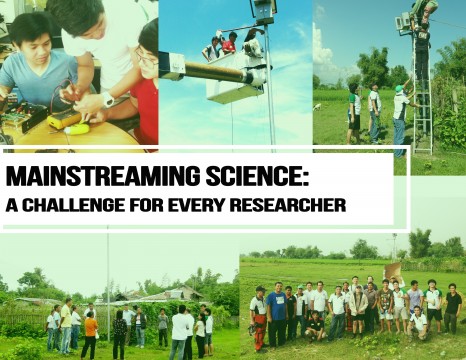Mainstreaming science: a challenge for every researcher

Experts and Stakeholders to meet in Isabela for Climate-related Policy Forum
December 11, 2016
Port Vila, Vanuatu: Climate Vulnerability Assessment – Abridged Report
December 11, 2016Feature Story by Jackie Pugay
Manila, Philippines— With thousands of research studies and projects produced every year, what makes each one different from the other? Or rather, what should these studies have in common?
Societal impact. This is what Engr. Glenn Banaguas believes to be the most important purpose of any research. He stresses that no matter how technical a study is, it should always come down on how it will affect the society.
Banaguas is one of the Outstanding Young Scientists of the Philippines for Environmental Management. He is currently a senior research scientist at the De La Salle Araneta University – University Research Center (DLSAU-URC) and a research consultant for the Asian Development Bank. His works are mostly about risk analysis and climate change adaptation.
In 2013, he started a project entitled “Impact and Risk Analyses of Climate Variability on Food and Environmental Security in Tarlac Province”. It is funded by Oscar M. Lopez Center for Climate Change Adaptation and Disaster Risk Management Foundation Inc. in partnership with DLSAU- Environmental and Climate Change Research Institute. Two outputs of this project are ultrasonic flood detector systems installed in three municipalities in Tarlac last 2014 and a guidebook for farmers to be launched this year.
His projects are mostly devoted to agriculture because he believes that this is the poorest and the most vulnerable sector in country. Therefore, there is a need to conduct more studies concerning agriculture and its subsectors.
Science not just for scientists
Thousands and thousands of research are produced or published every year. Though communication between scientists is essential for peer reviewing research studies, another important aspect to look into is disseminating information among non-specialists.
Research results should not just be limited to the eyes of another researcher. Banaguas shares to his junior researchers that part of what they do is ensuring that their stakeholders are informed with what the research can contribute to their lives.
Mainstreaming science starts with engaging the stakeholders. In the research project conducted in Tarlac, Banaguas also held capacity-building trainings to the members of the community. With a positive response and cooperation from the people of Tarlac, they were able to educate the participants about climate change adaption and risk management.
Tailor fitting science-based solutions
“Every area has its own uniqueness, every area has its own problem, and every area has its own attack to address the problem.”
This is how Banaguas explained the recommendations of his research project to the policymakers of Tarlac.
Policymakers have strong role in the society. Through their informed decisions, the community will greatly benefit. That is why an essential part of a research is to provide relevant frameworks and solutions that could work with the existing policies and in the creation of new ones.
Banaguas also emphasizes that though getting various perspectives from different research studies is relevant, still what’s more important is finding the best possible solution in your own locality. The research project in Tarlac serves as a guide for the community and the policymakers because it provides them the pertinent information about their area – what happened, what is happening, and what has been happening.
The challenge
Today, many still believe that science is only for technical people. The challenge for researchers now is how will they fill the gap between the experts and the non-specialists? How can the impacts of the study trickle down to the community?
Future studies may contribute to knowledge generation but how can we further extend this to the people so that they may utilize the information?
Nevertheless, this challenge should not stop us from generating knowledge but rather finding innovative ways of packaging the knowledge in a form that is usable to the target users and beneficiaries.

